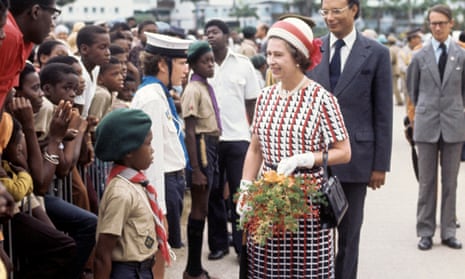Barbados’s recent announcement that it will become a republic, ending the tenure of the Queen as head of state by November 2021, is noteworthy not only for what is said about the island but also about changes in perception of Britain and its monarchy.
There is legitimacy in the stance taken by the prime minister, Mia Amor Mottley. A toddler in 1966 when “Little England” (as Barbados was referred to) achieved independence, this highly regarded Caribbean leader has strong nationalist and regional instincts. With many leading Commonwealth Caribbean countries already republics, she, like others born in the independence era, sees republicanism as a coming of age.
This decision was a while in coming. The 1998 constitutional commission recommended the change from an external, hereditary monarchy to a native presidency. In 2003, Barbados proudly replaced the British Judicial Committee of the Privy Council with the Caribbean Court of Justice as its final court. In 2016, during the country’s golden jubilee independence celebrations, Freundel Stuart, the erstwhile prime minister, spoke of the “move from a monarchical system to a republican form of government in the near future”.
So while this was expected, the decision to move forward now is still momentous. The ties between Barbados and the UK are strong. Historically a prized colony, its statue of Lord Nelson in the capital, Bridgetown, predates the one in London. Barbados receives the largest share of British tourists to the Caribbean, and was once the only destination in the region to have a regular Concorde service.
The timing of playing the republican card was strategic. The issue dominates local political discourse more than the other proposed legislative changes towards same-sex unions and decriminalisation of marijuana use, which would normally evoke greater consternation. The republican debate also serves to distract from the reality that, due to Covid-19, Barbados’s tourism-based economy is in its most dire situation since independence.
The Windrush scandal and the Black Lives Matter movement have altered perceptions of the colonial “mother country”. This is best evidenced in the public demand, supported by some government ministers, for the removal of Nelson’s statue and the recent consolidation of relationships with African countries, including an announcement of plans to open embassies in Ghana and Kenya. Theresa May’s ill-conceived and xenophobic immigration policy “to create a really hostile environment for illegal immigrants” violated the rights of many elderly, West Indian-born, long-time UK residents. The less fortunate got detained, and some were deported. However, the roots of the Windrush scandal was the perpetuation of institutional racism, first brought to the British public’s attention in the 1999 Macpherson report.
When West Indians initially landed in Britain, they were denied their rights as full citizens of the United Kingdom and colonies. Under the 1948 Nationality Act, their journey was an act of internal migration no different to the movement of the English, Scots, Welsh and Northern Irish within national borders.
The continuing bias against these West Indians was further reflected by the fact that, in recent years, they were not treated as anomalies to be regularised but instead as “illegal immigrants”. Insult was added to injury when the burden of proof was placed on those already “under suspicion” to prove to the Home Office their right to remain in the UK.
Although apolitical, the Queen has acted to guide British sentiment during crises. Having done this during the 2014 Scottish referendum by urging voters to “think very carefully about the future”, she could have similarly acted in her role as head of the Commonwealth when the Windrush scandal erupted on the eve of the Commonwealth summit in 2018. She did not. Encouragement from her to the British government to reinforce its commitment, in its current role of Commonwealth chair-in-office, to multiculturalism and the rights of all its citizens would have been welcome and justified.
Clearly, the Home Office hasn’t overcome the institutional racism exposed in its handling of the Windrush scandal. While the home secretary, Priti Patel, accepted all 30 recommendations of the Windrush scandal review, the Home Office demands that Windrush victims prove their case for compensation for pain and suffering “beyond reasonable doubt” – the standard normally reserved for criminal matters. Having already experienced injustice, distress and trauma at the hands of the Home Office, victims suffer further.
Those sceptics who in 2018 dismissed the creation of “Windrush Day” as political spin and an attempt to push the issue on to a political back-burner were proven right. The lingering Windrush scandal is a blot on Britain’s socio-political landscape and repudiation of its notions of fair play.
Hope springs eternal. In July, on ITV’s Good Morning Britain, Prime Minister Mottley, noting the continued problem of “mental slavery”, renewed calls for reparations by Britain and other former colonial powers for the transatlantic slave trade. She subsequently appointed a special envoy for reparations and agreed to relocate the statue of Lord Nelson.
Her actions echoed the words of Errol Walton Barrow, the first prime minister of Barbados, at the 1966 independence conference at Lancaster House, when he declared that that Barbados would not “be found loitering on colonial premises after closing time”. In becoming a republic, this small island developing state helps to expose the tarnished underbelly of “global Britain”. I anticipate that others will follow suit. Vive la République.
Guy Hewitt served as Barbados high commissioner to the United Kingdom from 2014 to 2018
